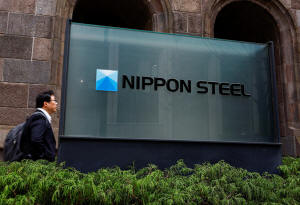US fears Nippon bid for US Steel could hit vital steel supplies
 Send a link to a friend
Send a link to a friend
 [September 06, 2024] By
Alexandra Alper [September 06, 2024] By
Alexandra Alper
WASHINGTON (Reuters) -Nippon Steel's proposed $14.9 billion takeover of
U.S. Steel would create national security risks because it could hurt
the supply of steel needed for critical transportation, construction and
agriculture projects, the U.S. said in a letter sent to the companies
and seen by Reuters.
The letter also cited a global glut of cheap Chinese steel, and said
that under Nippon, a Japanese company, U.S. Steel would be less likely
to seek tariffs on foreign steel importers.
The Committee on Foreign Investment in the U.S. (CFIUS) said in its
17-page letter sent on Saturday to Nippon Steel and U.S. Steel, and
first reported by Reuters, that decisions by Nippon could "lead to a
reduction in domestic steel production capacity."
CFIUS added: "While U.S. Steel frequently petitions for (trade) relief,
Nippon Steel features prominently as a foreign respondent resisting
trade relief for the U.S. domestic steel industry."
The letter provided a first glimpse of the national security grounds
that the Biden administration could use as a basis for its expected move
to block the merger, even as the companies and many industry experts
questioned the strength of the arguments.

"By almost any measure, the issues identified by the committee are not
ones that would fall into the national security bucket, but quite
clearly into two others: Nationalistic trade protectionism and electoral
politics," said Michael Leiter, a CFIUS lawyer in Washington, D.C. not
involved in the deal.
If the government is "truly worried about maintaining steel supply here
in the United States, the real solution is not to block this deal, but
instead to use the CFIUS hammer to ensure that Nippon Steel makes and
maintains such investments," he added.
The deal has become a political hot potato, with many Republican and
Democratic lawmakers voicing opposition to it. Vice President and
Democratic presidential candidate Kamala Harris said on Monday at a
rally in Pennsylvania, the swing state where U.S. Steel is
headquartered, that she wants U.S. Steel to remain "American owned and
operated." Her Republican rival Donald Trump has pledged to block the
deal if elected.
China looms large in the background of the trade concerns described by
CFIUS. According to the committee, China's "persistent use of
market-distorting government interventions" has allowed the country to
unfairly gain dominance in the global steel market, as it exports
extensive surplus steel that artificially lowers international prices.
It also cited 2022 data that showed China produced about 54% of total
global crude steel and was the largest exporter.
[to top of second column] |

Nippon Steel logo is displayed at the company's headquarters in
Tokyo, Japan April 1, 2024. REUTERS/Issei Kato

In a 100-page response letter seen by Reuters and sent on Tuesday,
Nippon Steel said it will invest billions of dollars to maintain and
boost U.S. Steel facilities that otherwise would have been idled,
"indisputably" allowing it to "maintain and potentially increase
domestic steelmaking capacity in the United States."
Nippon also reaffirmed a promise not to transfer any U.S. Steel
production capacity or jobs outside the U.S. and would not interfere
in any of U.S. Steel's decisions on trade matters, including
decisions to pursue trade measures under U.S. law against unfair
trade practices.
The deal, Nippon added, would "create a stronger global competitor
to China grounded in the close relationship between U.S. and Japan."
Nippon even proposed a national security agreement, aimed at
assuaging CFIUS concerns, with pledges that a majority of U.S.
Steel's board of directors would be non-dual U.S. citizens,
including three independent directors approved by CFIUS to oversee
compliance with the agreement.
"Nippon is throwing a financial lifeline to U.S. Steel while
allowing it to remain led and managed by U.S. persons with
government oversight," said Nicholas Klein, a CFIUS lawyer with DLA
Piper. "I would think that CFIUS could mitigate the risk of
reduction in steel production capacity through supply assurance and
other common mitigation measures."
The committee, which reviews foreign investments for national
security threats, also sees risk arising from Nippon's growing
presence in India, where production costs are much lower than in the
U.S.

"Nippon Steel has no economic incentive to, and will not, import
Indian-origin...steel into the United States to compete with or
undermine U.S. Steel, which would directly contradict the basis for
Nippon Steelís multi-billion dollar investment," the companies
countered in their Tuesday letter.
(Additional reporting by David Shepardson; editing by Chris Sanders,
David Gregorio and Sonali Paul)
[© 2024 Thomson Reuters. All rights
reserved.]
This material may not be published,
broadcast, rewritten or redistributed.
Thompson Reuters is solely responsible for this content. |